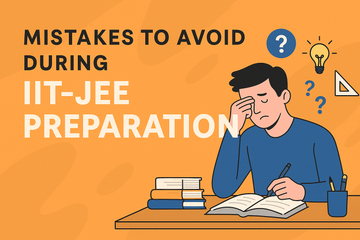The IIT-JEE (Joint Entrance Examination) is more than just a test-it’s a doorway to India’s most prestigious engineering institutions like the Indian Institutes of Technology (IITs), NITs, and other top-tier engineering colleges. With over 10-12 lakh students appearing for JEE Main and only a small percentage making it to the IITs, the competition is undeniably intense.
In such a high-stakes exam, it's not just about how hard you study—it’s about how smartly you avoid mistakes. Many talented students lose out on their dream IIT seats because of avoidable errors during their preparation journey. If you're preparing for JEE Main or Advanced, understanding these common mistakes is just as crucial as mastering the syllabus.
In this detailed guide, we’ll walk you through the top mistakes students make during IIT-JEE preparation, and more importantly, how to steer clear of them.
1. Not Having a Proper Study Plan
The Mistake:
Jumping into preparation without a clear roadmap is like setting out on a journey without a destination. Many aspirants start studying with full energy but no structure, leading to burnout or misdirection.
Why It Hurts:
Without a proper study plan, you’ll likely waste time on unimportant topics or miss out on critical ones. This also leads to uneven preparation and poor time management.
What You Should Do:
- Create a realistic timetable based on your school/college hours.
- Allocate time for Physics, Chemistry, and Math each day.
- Keep buffer days for revisions and mock tests.
- Divide your preparation into phases: Foundation → Practice → Mock Tests → Revision.
2. Ignoring the Syllabus and Exam Pattern
The Mistake:
Many students prepare randomly or follow too many books, not aligned with the official JEE syllabus or latest exam pattern.
Why It Hurts:
You might end up studying topics that aren’t even part of the exam or missing important ones. Also, JEE Main and Advanced have different formats and focus areas.
What You Should Do:
- Keep a printed copy of the latest syllabus handy at all times.
- Understand the difference between JEE Main vs. JEE Advanced formats.
- Focus on NCERT basics, especially for Chemistry.
- Prioritize high-weightage topics based on previous years’ trends.
3. Following Too Many Books and Resources
The Mistake:
In the urge to leave no stone unturned, students hoard multiple books per subject, YouTube channels, and coaching notes.
Why It Hurts:
This leads to information overload and confusion. You’ll spend more time choosing what to read than actually studying.
What You Should Do:
- Stick to one or two trusted sources per subject:
- Follow one coaching institute’s material if you're enrolled.
- Focus more on conceptual clarity and practice than collecting resources.
4. Not Clearing Basics Before Jumping to Advanced Problems
The Mistake:
Some aspirants dive straight into advanced-level problems without mastering the basics.
Why It Hurts:
Without clear fundamentals, solving higher-level problems becomes frustrating, leading to low confidence and wasted time.
What You Should Do:
- Master the basic concepts thoroughly from NCERT or your coaching notes.
- Use standard books for foundational theory and basic exercises.
- Gradually level up to more challenging questions.
- Don’t skip solved examples—they often reveal key approaches.
5. Poor Time Management During Preparation
The Mistake:
Some students either study excessively long hours without breaks or procrastinate under pressure, leading to inconsistency.
Why It Hurts:
Burnout, loss of motivation, and incomplete syllabus coverage are common outcomes.
What You Should Do:
- Follow the Pomodoro technique or 50–10 study cycle (50 minutes study + 10 minutes break).
- Use planners or digital tools like Google Calendar, Notion, or Trello to track your time.
- Prioritize based on urgency and importance.
6. Ignoring Mock Tests and Previous Year Papers
The Mistake:
Many students wait until the last month to start taking mock tests, thinking they first need to finish the syllabus.
Why It Hurts:
Mock tests help build exam temperament, improve speed and accuracy, and highlight your weak areas. Starting late limits your improvement time.
What You Should Do:
- Begin solving mock tests after 3–4 months of solid concept-building.
- Take JEE Main mock tests every week, and JEE Advanced pattern tests as you progress.
- Analyze each mock test thoroughly:
- Identify your silly mistakes
- Track time per section
- Focus on accuracy vs speed
7. Not Revising Regularly
The Mistake:
Revision is often postponed or neglected. Many students believe once a topic is studied, it’s done for good.
Why It Hurts:
With time, even strong topics fade from memory. You might remember formulas but forget the approach during exams.
What You Should Do:
- Allocate weekly revision slots in your timetable.
- Maintain short notes and formula sheets for every subject.
- Use flashcards or apps like Anki for quick review.
- Practice mixed-topic tests to refresh old concepts.
8. Not Focusing on Weak Areas
The Mistake:
We all like solving problems we’re good at. But many students avoid tough subjects or topics altogether.
Why It Hurts:
Your overall score suffers because JEE doesn’t allow sectional choice. All subjects contribute equally to the final result.
What You Should Do:
- Identify weak topics using mock tests.
- Allot extra time and simpler resources to them.
- Take help from teachers, peers, or YouTube explainers.
- Don’t avoid a topic—break it into manageable chunks.
9. Overlooking Physical and Mental Health
The Mistake:
Studying day and night with no exercise, sleep, or social interaction can wreck your health.
Why It Hurts:
Lack of sleep and poor nutrition impact your memory, concentration, and emotional well-being, all of which are crucial for success.
What You Should Do:
- Ensure 7–8 hours of sleep every night.
- Eat a balanced diet with fruits, vegetables, and enough water.
- Include light exercise or yoga in your daily routine.
- Don’t isolate yourself completely—stay connected with family and friends for emotional support.
10. Neglecting Chemistry—Especially NCERT
The Mistake:
Many students treat Chemistry as less important or try to use tough books without reading NCERT.
Why It Hurts:
JEE Main asks a significant number of direct questions from NCERT, especially in Inorganic and Organic Chemistry.
What You Should Do:
- Read NCERT line-by-line for Inorganic and Organic Chemistry.
- Highlight important reactions and concepts.
- Solve NCERT exercises multiple times.
- Supplement with other books only after mastering NCERT.
11. Panicking Before Exams
The Mistake:
Last-minute cramming, comparing with peers, or worrying about ranks can trigger panic.
Why It Hurts:
Anxiety can lead to silly mistakes, inability to recall known concepts, and reduced performance under pressure.
What You Should Do:
- Practice mindfulness and breathing exercises.
- Focus on your personal progress, not others.
- Stick to a pre-decided revision strategy in the final days.
- Avoid new topics just before the exam.
12. Not Having an Exam Strategy
The Mistake:
Many students go into the exam without a strategy for time allocation, question selection, or attempts.
Why It Hurts:
Poor strategy leads to wasted time on tough questions, panicked guesses, or skipped easy questions.
What You Should Do:
- Decide your order of attempt: PCM or CMP, etc.
- Allocate specific time per section.
- Follow the “3-cycle approach”:
- Easy questions first
- Medium ones next
- Toughest ones at the end
- Avoid negative marking by skipping doubtful MCQs.
13. Losing Self-Belief
The Mistake:
Comparison, setbacks in tests, or peer pressure can lead to self-doubt and hopelessness.
Why It Hurts:
A negative mindset affects your ability to bounce back, take tests seriously, and give your 100%.
What You Should Do:
- Remember that consistency beats intelligence.
- Focus on daily goals, not the distant outcome.
- Read success stories of students who started late or struggled initially.
- Keep a growth mindset: Every test is an opportunity to improve.
14. Depending Entirely on Coaching Institutes
The Mistake:
Some students blindly rely on coaching classes to do the heavy lifting, without self-effort.
Why It Hurts:
Coaching is a support system—not a substitute for self-study. You must actively revise, practice, and question everything.
What You Should Do:
- Review what you learn in class within 24 hours.
- Practice DPPs (Daily Practice Problems) diligently.
- Ask doubts regularly, don’t hesitate.
- Remember: Success is 70% self-study, 30% coaching.
Final Thoughts: Smart Preparation Wins the Race
Success in IIT-JEE is not just for the top rankers or “born geniuses.” It’s for those who stay disciplined, focused, and learn from their mistakes. The competition is tough—but so are you.
Avoiding the above mistakes can give you the edge you need. Remember, the goal is not just to study harder, but smarter.








Avoiding the mistakes are equally important as serious preparation to crack JEE Exam.
apgmje